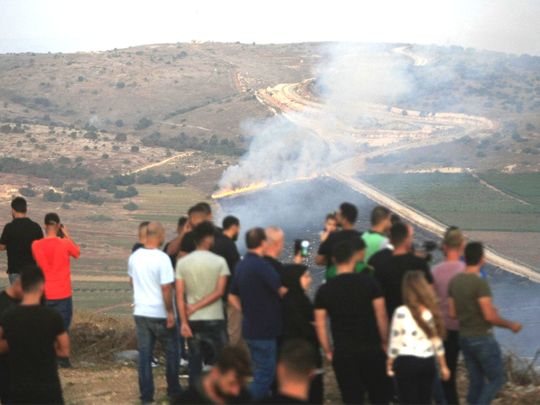
After a week of exchanging threats amid heightened tensions along the Lebanese-Israeli borders, both Hezbollah and Israel were contented with the former’s limited action and the latter’s calculated response. For now this round of confrontation ended in a draw; both sides feeling relieved and victorious. Last Sunday’s firing of anti-tank Kornet missiles at an Israeli army base and a military vehicle across the border was seen as a restrained response by the pro-Iran Lebanese militia to the 24-25 August attacks by Israel at the heart of Beirut’s southern district and against a Hezbollah cell south of Damascus.
Israel has been targeting Hezbollah and Iranian positions in Syria for months. Its latest strike in Syria had killed two Hezbollah operatives. Israel claimed that the group was preparing to infiltrate the occupied Golan Heights with killer drones. But what triggered a solemn threat to respond by Hezbollah leader Hassan Nasrallah was the downing of two Israeli drones in the southern district of Beirut in what was seen as a breach of the rules of engagement under resolution 1701 that were upheld since the end of the July 2006 war between the two sides.
Political survival
Nasrallah, backed by the Lebanese government, vowed to respond quickly and firmly and protect Lebanon’s sovereignty. Israeli Prime Minister Benjamin Netanyahu, who is fighting for his political survival, responded with his own warnings. For days the border towns on either side braced for what could be a major conflagration. But on Sunday both sides appeared to be avoiding a deeper clash. Israel’s response to Hezbollah’s missiles was a careful and deliberate targeting of empty fields near Lebanese towns. Israel denied Hezbollah reports that there were casualties in its military. The salvage operation following the vehicle strike, it claimed, was orchestrated.
If anything this latest round underlined the difficult situation that both Netanyahu and Nasrallah find themselves in. Neither man can afford to be dragged into an open war. Netanyahu wanted to reassure his followers that he is a strong leader who is not afraid to confront Israel’s most dangerous foe today. And Nasrallah, whose fighters in Syria had been targeted more often than not, needed to remind Israel as well as countrymen that Hezbollah was still capable of responding to Israeli provocations.
But both men know that their enmity is now part of a regional crisis that is much bigger and more complex. For Netanyahu, his obsession with Iran’s nuclear threat has forced the US administration into a diplomatic Catch-22. President Donald Trump’s withdrawal from the multiparty nuclear deal with Iran in 2018 has so far failed to convince Tehran to renegotiate a new agreement. Moreover, it led to Iran walking back on its commitments not to enrich uranium.
Biting US sanctions
The deal, which the Europeans, Russia and China, still support, is in danger of collapse as Iran suffers from biting US sanctions. If that happens then Israel will be the chief loser at a time when Washington appears hesitant to engage Iran militarily.
Moreover, Israeli strikes against Iraq’s Popular Mobilization Forces (PMF) in recent weeks have helped Iran — as their chief backer — rebrand the militias as anti-American and anti-Israel. PMF leaders have vowed to target US military presence in Iraq.
Most analysts agree that Israeli strikes in Syria and Iraq will hardly affect the military capabilities of pro-Iran groups. Recently, the Israeli army upgraded the threat of Hezbollah’s precision missiles as second to Iran’s uranium enrichment program. The Lebanese militia is said to be in possession of thousands of missiles that can reach deep in the heart of Israel.
Theatre of confrontation
An open war between the two sides is unlikely only because it promises to be a catastrophic one for both Lebanon and Israel. For now a balance of mutual deterrence seems to have been achieved; leaving war-torn Syria as the only open theatre for confrontation.
It also appears that despite the present state of preparedness by Israel and Hezbollah we will see a period of calm at least until the end of Israeli general elections in two weeks’ time. The outcome of that election will determine what could come next for an Israel that is becoming increasingly worried about the consequences of geopolitical shifts in its neighbourhood. Eventually, Israel cannot afford to maintain the status quo and will have to act.
For Tehran the latest round was a test for its proxies in the region; one that it is happy to employ — in Iraq, Syria, Lebanon and Yemen — as it seeks a way out of its current economic and political ordeals.
— Osama Al Sharif is a journalist and political commentator based in Amman.









